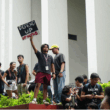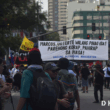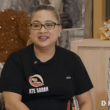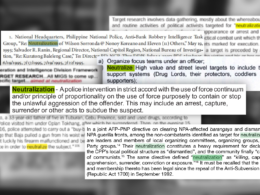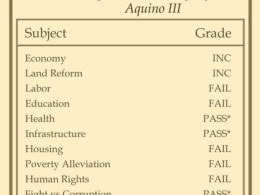The coronavirus disease (COVID-19) makes no distinction between province or metropolis, which gives additional challenges for local government units (LGUs) responding to the pandemic.
Without an overarching plan from the national government, the countermeasures for COVID-19 falls unto LGUs.
As of April 8, the Philippines has 3,870 confirmed cases. These regions have the highest number of confirmed cases: Calabarzon, Cagayan, Central Luzon, Central Visayas, and Davao. Calabarzon has 127 cases, the highest outside the National Capital Region.
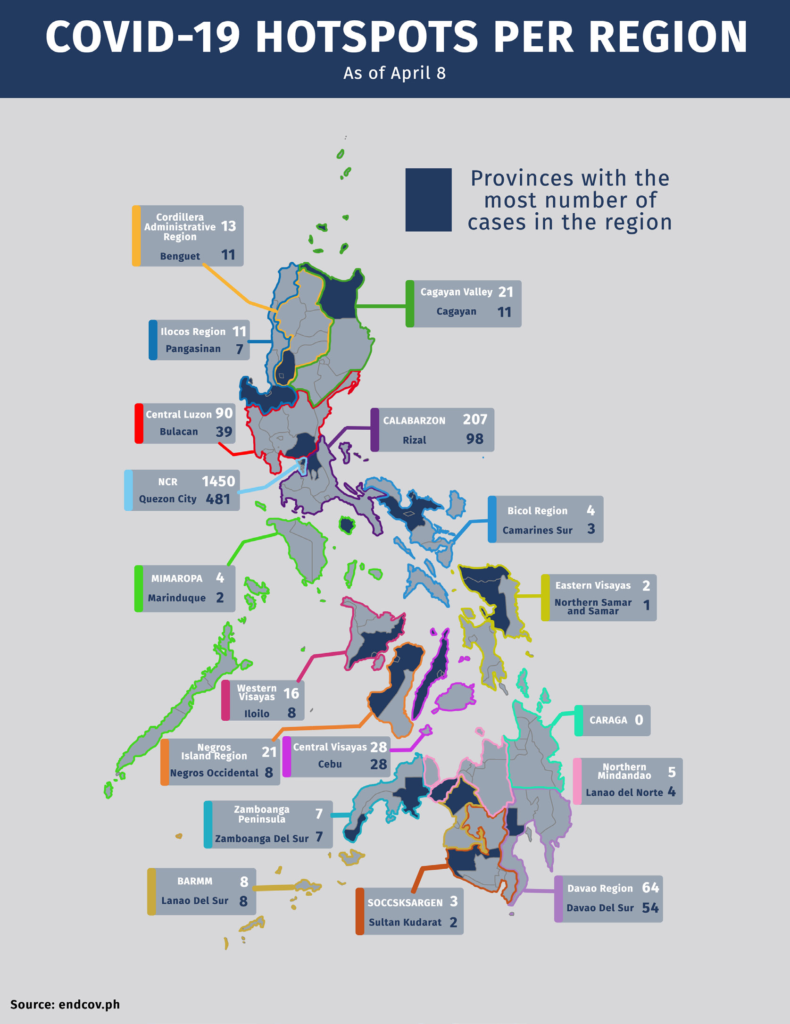
The endcov.ph tracker shows these provinces have the most confirmed cases: Rizal, Davao Del Sur, Cavite, Bulacan, Laguna, Cebu, Batangas, Nueva Ecija, Pampanga, and Cagayan.
A confirmed case uses one kit to detect the virus and will use two to three later to confirm their recovery. The high demand leaves some provinces dependent on the Department of Health (DOH) and private sectors for test kits.
Power company MORE Electric and Power Corp. donated 500 rapid test kits for Iloilo on top of the 5,000 test kits provided by DOH. Private water distribution company Metro Pacific Water donated P1.2 million to get more.
Cavite Governor Jonvic Remulla plans to get 900 persons under investigation (PUIs) tested after the Holy Week using 20,000 test kits.
Medical protocols and preventive measures
Department of Interior and Local Government Secretary Eduardo Año ordered the creation of Barangay Health Emergency Response Teams to ensure all citizens are accounted for.
But the lack of national directives and protocols in the earlier days of the pandemic forced provinces to ensure the safety of their constituents on their own.
Cagayan Valley relied on national government protocols for its supplies and personal protective equipment (PPEs). Requests for PPEs are sent via email and processed by DOH or its regional offices. Donations from the private sector are also consolidated by the Office of Civil Defense before being turned over to DOH for distribution.
Health Undersecretary Maria Rosario Vergeire said the DOH has been able to release requested PPEs in the regions of Ilocos, Cagayan Valley, Apayao, Cordillera, Calabarzon, and Sorsogon. Cagayan was only able to receive these PPEs on April 1, two weeks after the implementation of Luzon-wide Enhanced Community Quarantine (ECQ).
Davao del Sur proposed a budget of P20 million to buy PPEs for health workers and aid residents who lost income due to the ECQ. Since the Davao ECQ only took effect on April 4, it has yet to announce and implement medical protocols and prevention programs for the province.
Common preventive measures such as disinfecting public areas, constructing testing and quarantine facilities, providing housing for health workers, and procuring budget for PPEs have been adopted.
Symptomatic persons in Bulacan are placed under a Barangay Unit Isolation and will await testing from a health official. Gov. Daniel Fernando said they will use the newly built extension building of the Bulacan Medical Center as its central quarantine facility to isolate those infected with COVID-19.
Cavite, which has a laboratory capable of testing at De La Salle University-Dasmariñas, awaits certification from DOH and Research Institute for Tropical Medicine. It is expecting certification by April 12.
Cebu Governor Edgar Labella coordinates with the Fire Department for the disinfection of barangays and endorses housing initiatives of White Knight and Bradford Church Cebu which offers 40 free rooms for medical frontliners.
Implementation of safety measures
Several provinces have been put under lockdown, which includes checkpoints, curfews, and social distancing. Residents are instructed to stay at home with exceptions made only for those holding quarantine passes or providing needed services such as medical, funeral, food, banking, utility, or security services.
Laguna has made a protocol stating that people are not allowed to leave their homes without wearing proper safety equipment.
The Ilonggo city council was pushed to amend the existing anti-discrimination ordinance in order for its frontliners to be better protected against discrimination by businesses.
LGUs and police forces have been quick to respond to those that violate safety guidelines.
In Central Luzon, over 11,000 residents were arrested and fined for violating the ECQ in the first two weeks of lockdown. They were caught breaking curfew, smoking or drinking in prohibited places, and disregarding checkpoint rules.
Criminal charges were also filed against Cavite Mayor Dino Reyes Chua and two others for allegedly spreading false information on a COVID-19 case in the city. Rappler reports Chua remains “unfazed” and is ready to defend himself in court, citing his Facebook post which continues to criticize LGUs’ responses.
They face two months in jail and/or a fine of up to P1 million if they are found to have created, perpetrated, or spread false information on the crisis in line with the Bayanihan to Heal as One Act.
Relief efforts
Aurora’s official government website reported distribution of 7,000 food packs and predicts bringing the number up to 15,700 after the second wave of distribution.
Technical Education and Skills Development Authority (TESDA) also distributed goods, obtained through volunteer work, to different parts of Cagayan Valley.
Under the Bayanihan Act, the Department of Social Welfare and Development is set to aid the vulnerable. In Central Visayas, beneficiaries will receive P6,000 based on the region’s minimum wage of P404 multiplied by 15 days.
Several LGUs have also established mobile markets for citizens and farmers, as in the case of Tacloban. This is to lessen crowds in wet markets and public establishments while the city is quarantined.
LGUs have also taken initiatives to ensure that their frontliners are cared for. In Iloilo, the LGU and residents have worked together to provide temporary dorms for health care workers, shuttle services for nurses and doctors, and PPEs for frontliners.
In order to provide respite to citizens, guidelines have also been implemented by the national government. A price freeze for basic necessities was implemented upon the declaration of a state of calamity. Under this, LGUs were encouraged to form teams which could help in ensuring that needed goods were not hoarded or overpriced.
In Isabela, police were able to arrest two citizens who hoarded isopropyl alcohol with the intent of reselling this at a higher cost.
Stringent policies, however, such as Bulacan’s “no food stub, no relief goods” has caused distress as in the case of a grandmother who broke down after relief operations skipped over her.
This pandemic has disrupted life, and everyone will be dealing with wounds left long after it’s gone. But with the tally for confirmed cases still running and the national responses still without the cohesion, provinces pay different costs in the pursuit of flattening the curve.
This article first appeared in KRISIS (AY 2019-2020) – COVID-19 Pandemic Issue on April 12, 2020.



